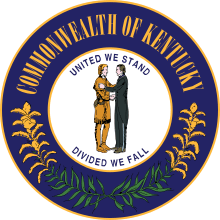Alexander Scott Bullitt
Alexander Scott Bullitt (1761 – April 13, 1816) was an American pioneer, planter, and statesman who was an early settler in Kentucky. He was a political leader in the early days of Kentucky statehood.
Alexander Scott Bullitt | |
|---|---|
Commonwealth of Kentucky Historical marker reads: Lyndon An early settler, Alvin Wood, named this community in 1871. One of America's oldest military schools, Ky. Military Institute founded, 1845; moved here , 1896. Points of interest in area: Central State Hospital, founded on site of Isaac Hite's home, and Oxmoor, home of Alexander Scott Bullitt who helped draft first Ky State Constitution. | |
| 1st Lieutenant Governor of Kentucky | |
| In office 1800–1804 | |
| Governor | James Garrard |
| Preceded by | Office established |
| Succeeded by | John Caldwell |
| Personal details | |
| Born | 1761 Prince William County, Colony of Virginia British Empire |
| Died | April 13, 1816 Oxmoor Farm Louisville, Kentucky United States |
| Spouse(s) | Priscilla Christian (1785-1806; her death) Mary Churchill Prather |
| Children | 6 |
| Parents | Cuthbert Bullitt (father) Helen Scott (mother) |
| Occupation | pioneer, politician, planter |
Bullitt's family had come to America as refugee French Huguenots in 1685. Arriving first in Maryland, part of the family settled in Prince William County, Virginia. Alexander was born there in 1761, the son of colonial planter Cuthbert Bullitt and Helen (Scott) Bullitt. His father was a leading lawyer in local and colonial affairs. Alexander's early schooling was directed at making him a lawyer. But his uncle Thomas Bullitt was a pioneer and military leader, involved with western exploration. In 1783 Alexander followed in his uncle's footsteps and moved to Kentucky.
Settling in Kentucky
Bullitt settled first in an area that is now Shelby County but soon found the area too isolated, and subject to Indian attacks. His uncle Thomas had surveyed a town site in 1773 at the Falls of the Ohio, and in 1800 the Virginia legislature named it Louisville. Alexander bought 1000 acres (4 km²) about 9 miles (14 km) south of there and began his farm again. He named the plantation Oxmoor, after the fictional farm in Tristram Shandy. In 1784 he made his first steps in Kentucky politics. He became an officer in the local militia, and met with others at Danville in a convention that first proposed a separation from Virginia.
In August 1785, his neighbor, Colonel William Christian, who had been developing a neighboring property, brought his wife Anne (née Henry) and family from Virginia. Two months later Alexander married their young daughter Priscilla. While this improved his political connections (her uncle was Patrick Henry), they were a devoted couple. They built Oxmoor Farm, starting the main house in 1787, and there they grew tobacco, hemp, and corn. They raised a family of four: William Christian, Anne, Helen Scott, Cuthbert on the farm.
Political career
After Colonel Christian was killed in a skirmish with Indians in 1786, Bullitt became a major in the militia. He was made a trustee of the town of Louisville. In 1792 when the idea of Kentucky statehood was accepted, he was a delegate to the Convention (again in Danville) where he was on the committee that drafted the first state Constitution. With the new constitution in place, in June he was one of twelve men elected to the State Senate. He was elected its speaker, and served there until 1800.
When a second state constitution was sought, in 1799, Bullitt presided at the convention that wrote it. This new constitution created the office of Lieutenant Governor and he was elected to that office in 1800 serving under Governor James Garrard.
In 1804 Bullitt returned to private life and the full-time development of Oxmoor.
After his first wife died in 1806, Bullitt remarried, to widow Mary Churchill Prather. They had two children, Thomas James and Mary (Polly). Henry Clay's last court case, concerned the will of Mary (Polly) Bullitt that was challenged by Alexander Scott Bullitt's two sons[1]
He died at his home in 1816 and is buried in the family graveyard at Oxmoor. Bullitt County, Kentucky was named in his honor.[2]
Further reading
- Johnson, E. Polk (1912). A History of Kentucky and Kentuckians: The Leaders and Representative Men in Commerce, Industry and Modern Activities. Lewis Publishing Company. p. 607. Retrieved 2008-11-10.
- Heidler, David S. and Jeanne T. (2010). Henry Clay: The Essential American. Random House.
| Political offices | ||
|---|---|---|
| Preceded by (none) |
Lieutenant Governor of Kentucky 1800–1804 |
Succeeded by John Caldwell |
References
- described in Henry Clay, the Essential American by David S. and Jeanne T. Heidler.
- The Register of the Kentucky State Historical Society, Volume 1. Kentucky State Historical Society. 1903. pp. 34.
